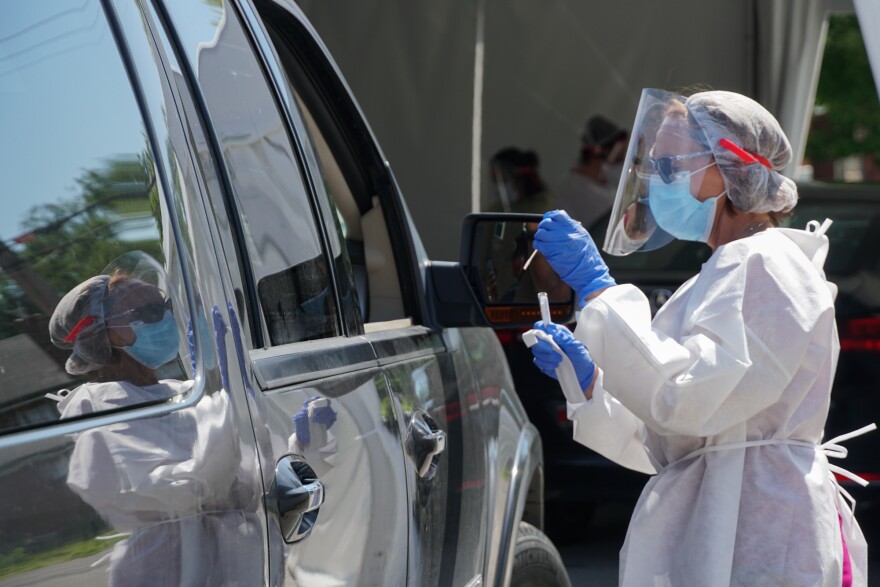In late June, when a customer at Herbie’s restaurant in Clayton tested positive for the coronavirus, owner Aaron Teitelbaum immediately closed the business and told employees to get tested to see if they were infected.
Teitelbaum expected to wait a few days for his employees’ results to come back. But almost three weeks later, many were still waiting — and they had plenty of company.
“Our employees did not start to receive any test results for about six days,” Teitelbaum said Wednesday on St. Louis on the Air. “There were some that we are just now inviting back weeks later, and that’s because they’ve just received their results.”
Nearly 10,000 people are now being tested each day in Missouri, twice as many as a month ago. Public officials have encouraged anyone who thinks they need a test to get one, even if they don't have symptoms.
However, labs cannot process tests fast enough to deliver results within a few days. Patients are waiting up to two weeks to learn if they have tested positive or negative for the virus.
“The real purpose of getting the test in the first place is to identify early on so you can mitigate the disease and contain the spread of the disease,” said Dr. Hari Nallapaneni, chief medical officer at CareSTL Health, a community health center in St. Louis. “In delaying the tests results, you are probably not doing the best job.”
Once a person knows they have tested positive for the virus, they can isolate themselves and contact others who may have been exposed, he said.
It usually only takes an hour for a diagnostic machine to process a coronavirus sample, Nallapeneni said. The delay comes from transporting the samples to diagnostic labs, using machines that can only process a certain number of tests at a time, and contacting patients about their results.
At Affinia Health clinics in St. Louis, doctors are waiting more than a week to receive results sent to a commercial lab in another state for processing, said Dr. Kendra Holmes, the clinic’s chief operating officer.
“It definitely limits the likelihood of it being accurate,” she said.
Unless people quarantine themselves until the results are processed, Holmes said, there is a chance they could have caught the virus in the meantime or unknowingly spread it to others.
“What makes it really difficult is a lot of people aren’t showing symptoms," she said. "It’s much easier if you’re symptomatic, you know you need to quarantine.”
Hospitals and some local clinics have their own independent labs that can process diagnostic tests. But other clinics rely on national commercial labs such as Quest Diagnostics or LabCorp to analyze the tests.
“As many people have seen in the media in the last couple of days, these labs have been inundated because they receive tests from around the country,” Dr. Alexander Garza, St Louis Metropolitan Pandemic Task Force commander, said Wednesday during St. Louis on the Air. “It’s simple logistics, we just don’t have the capacity.”
Those labs prioritize samples from people who have symptoms, Garza said. People who received a test because they were worried about exposure to a sick person, like the Herbie's employees, are pushed to the back end.
Affinia sends its testing samples by courier to a Quest lab in Kentucky, Holmes said. This week, a representative from Quest told her the processing time had increased to 14 days.
The delays have prompted Affinia to set up its own COVID-19 testing lab, she said. The clinic is working to professionally validate their new rapid testing machines and equipment. Unlike the traditional tests, rapid tests can process results within minutes, not days.
She expects many clinics to bring their coronavirus testing in-house as the pandemic continues.
Affinia and several other clinics in the region are prioritizing using rapid testing for first responders and health care workers who are in regular contact with people who are the most at risk for serious cases of COVID-19.
Others are frustrated by what they view as a disconnect between what public officials are encouraging people to do and what is possible for health care workers to handle.
“I signed up for it because I thought I would be a good thing to do, almost my duty to get tested,” said Randall Kopchak, a Florissant resident who works in retail who waited five days to receive his negative test results. “But in hindsight, what if I did have it? I was still going to work, I was still interacting with the public.”
Not everyone is able to quarantine themselves while waiting for their results, he said.
“In those five days, how many people did I come into contact with?” Kopchak said. “It doesn’t mean I don’t have it now, it means I didn’t have it when I got tested.”
Follow Sarah on Twitter: @petit_smudge
Our priority is you. Support coverage that’s reliable, trustworthy and more essential than ever. Donate today.
Send questions and comments about this story to feedback@stlpublicradio.org






